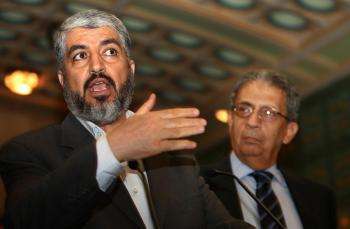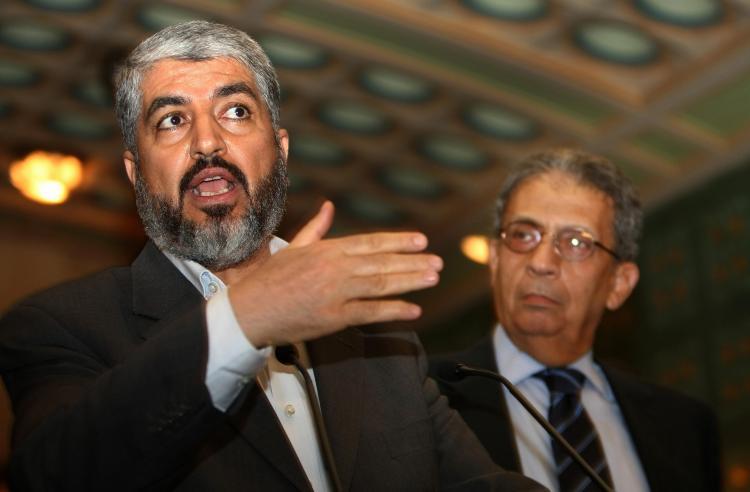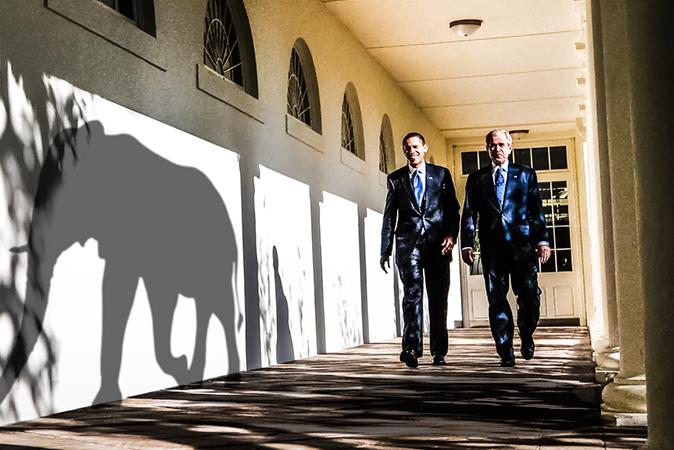In an interview with the Wall Street Journal at the end of July, Khaled Mashaal, exiled chairman of the Hamas political bureau, called on the U.S and the west to establish diplomatic relations with Hamas.
Mashaal said the organization is ready to cooperate with America in an effort to find a solution to the conflict between Israel and Palestine. In a separate interview with the New York Times in May, Mashaal said that Hamas will be part of any solution.
Other senior leaders in Hamas have made similar statements recently. Ahmed Yousef, deputy foreign minister of the Hamas administration, in an interview at the end of July with the Economist, said that, “Hamas is very close on recognition of Israel.” He also praised the June 4 speech given in Cairo by President Obama.
But contrary to Mashaal and other senior Hamas leaders’ conciliatory tone in the western media, their statements for Palestinian audiences were totally different.
According to a report by terrorism and intelligence experts at the Intelligence and Terrorism Information Center (ITIC), on May 7, three days after his interview with the New York Times, in a live speech broadcast from Damascus, Syria to a conference in Gaza City Mashaal made conflicting statements.
Mashaal was quoted in numerous Palestinian media, telling the conference that, “No one has the right to prevent the Gaza Strip from arming itself or to choke it to prevent weapons from reaching it.” Mashaal also emphasized that Hamas won’t concede on the subject of ”resistance” [i.e terrorism].
The ITIC report also indicates that, in “clarifying” his remarks for Palestinians in his interview with the Economist, Yousef denied the things ascribed to him. He was quoted on a Palestinian Web site as saying “an occupied people cannot be required to recognize those who stole its land, rather, the Zionists must recognize the rights of the Palestinian people.”
Careful Strategy
According to the authors of the ITIC report, the statements of Hamas leaders in the western media in the last few months are an attempt to try to ease its political isolation, improve its position versus the Palestinian authority, and get funds to rebuild the Gaza Strip.
“This is a characteristic of all Palestinian organizations for decades—saying one thing to home, one thing to Israel and other thing to the world,” said Dr. Mark Heller, investigator for the Institute for National Security Studies at Tel Aviv University.
Dr. Heller claims that all Hamas’s attempts to look good in the eyes of different audiences are to create pressure on Israel so it will agree to concessions.
“They see diplomacy as a continuation of war in other ways,” Heller added.
U.S. Administration Response
Despite the friendly statements from Hamas, the U.S. administration has not fallen for the statements.
The day the interview with Mashaal was published in the Wall Street Journal, the administration had a cool response. Philip J. Crowley, assistant secretary of state said during a press briefing that the Obama administration “will be focused on actions, not words.”
“If Mr. Mashaal is prepared to renounce terror and violence, if he’s prepared to recognize Israel, if he’s prepared to accept previous agreements, including the roadmap, then that would be a positive step,” said Crowley during the briefing.
“In the intervening time, if he wants to actually take actions that can improve the situation in the Middle East, he can start by declaring a ceasefire and by releasing Gilad Shalit.”
Culture of Resistance
The conciliatory tone displayed by Hamas leaders in the foreign media does not match with the organization’s ideology. The Hamas Convention from 1988, the most important ideology document of the organization, determined that non-compromise Jihad (struggle) must be maintained against Israel and absolute resistance must be held against any agreement that recognizes the existence of Israel.
In the interview to the Economist, Ahmed Yousef tried to minimize the importance of the Hamas convention while refusing to change it, saying, “We don’t use it. Why should we change it when we never use it?”
But experts argue that the Hamas policy hasn’t changed and that Hamas continues to stick to terrorism.
“I don’t see some kind of change in Hamas’s radical Islamic ideology,” said Jacob Cohen, head of the Palestine desk in the Middle East Media Research Institute, in a telephone interview from Jerusalem.
The ITIC also estimates that ideologically and strategically, Hamas remains committed to the final objective of the destruction of the state of Israel, and refuses to abandon or even modify its 1988 convention.
However, at the same time, ITIC estimates that Hamas does not reject temporary lulls in terrorist attacks for various longer or shorter periods of time, when it deems the interests of the Gazan population or movement require it.





